DANCE CLASS
CONTENTS: PAGE 1 | PAGE 2 | PAGE 3 | PAGE 4 | PAGE 5 | PAGE 6
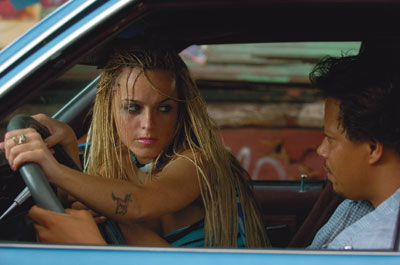 |
| Hustle & Flow |
(writer-director, Hustle & Flow):
I remember reading somewhere that Woody Allen would always do an extra take where the single objective was to “just go faster.” I found that these takes worked the best. I don’t think it had anything to with pacing as much as it had to do with comfort. It allowed the actors to relax, surrender to their choices and just do the damn thing.
PHIL MORRISON
(director, Junebug):
More than anything, what should’ve been obvious from the beginning became manifest. All the clichés about what it means to work fast and cheap came true. They were at once super-frustrating and, I think, made us feel like a family. So the result of the clichés was itself a cliché. And that was just fine.
One thing I didn’t expect: if there’s not much time, I can’t look at dailies. Fortunately there were some smart people watching them for anything egregious. To me, though, they were like getting in a backwards time machine when what we should be doing is trying to make this second right now as good and fun and true and right as we know how. I hope I wouldn’t feel this way on a longer shoot, but on this one I just couldn’t handle dailies.
Maybe I learned kind of a subset of the Cassavetes dictum about compromise. You understand in advance that it will be all about compromise — but what is that exactly? It occurred to me at some point that it was my job (and reasonably no one else’s) to always be thinking about this word: “instead.” Circumstances say, “We can’t do that,” and in the heat of the schedule it’s easy to misinterpret the compromise rule and say (perhaps sullenly), “Okay, too bad we can’t do it. Let’s move on,” or (of course), “No, no, no, it doesn’t matter, we must do it!” I had to remind myself that the real answer is, “Okay, what will we do instead?” And the movie ends up being all the things you did instead.
 |
| director Noah Baumbach |
(writer-director, The Squid and the Whale):
On my previous movies I had the editor put together a rough assemblage of the shot footage and screen it for me before I started to cut. I followed this procedure because it was standard, but this method always seemed counterintuitive — I felt like I was coming to an edit already in progress. I was undoing the movie rather than building it from the ground up. I didn’t start writing a screenplay by reworking an existing document; why should I cut that way? On The Squid and the Whale, I had the editor prepare by “stacking” each take, line by line, organizing the rushes for me on the Avid. We learned the movie as we assembled it — I felt I understood the logic of the cut much more thoroughly than I had in the past. There was never really a rough cut of The Squid and the Whale — by the time we’d arranged the movie from start to finish we were pretty close to the final edit.
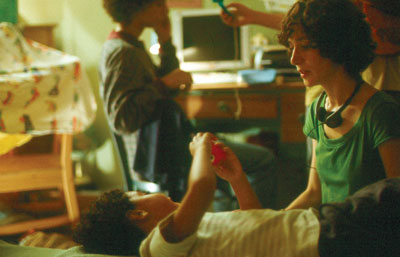 |
| director Miranda July |
(writer-director, Me and You and Everyone We Know):
I’m standing on the set waiting for everything to get adjusted — the lights and the props and all the other movie stuff — and my job is to just wait and silently urge everything forward with my special controlling energy. And I’m doing that, I’m actively doing that with all my might, when someone taps me on my hand. It’s six-year-old Brandon Ratcliff, who plays Robby. He says, “Jazz is my favorite kind of music.”
ME: Oh. When did you start listening to jazz?
BRANDON: (takes a moment to remember) In October.
ME: So, last month.
BRANDON: Yeah.
ME: What do you like about it?
BRANDON: I like that it’s kind of, like, smooth.
He makes a smooth motion with his hand, and we both watch as props are moved around us, a painting is lowered, a desk is moved an inch back and then forward again.
BRANDON: There’s another kind of music that I kind of like but I kind of don’t like it.
ME: What kind?
BRANDON: Rock ’n’ roll.
ME: Oh, yeah.
BRANDON: I like the words, but sometimes the sounds are too crazy and it hurts my heart. (He rubs his hand on his chest.)
See, I couldn’t keep up with the greatness of all the things that weren’t the movie. One time John Hawkes sang me this amazing song, just quietly, under his breath, while some kind of camera-related chaos was happening around us. It was about his uncle Fred turning into a bird. I also kept finding incredible things on the ground when we were shooting — pieces of love letters and torn photographs that, like these conversations, would remind me that this world that I was inventing did not exist apart from real life. When I knew this to be true I felt very agile, as if I was collaborating with some kind of wind that was sweeping through all of us. Fact, fiction, whatever — just keep moving.
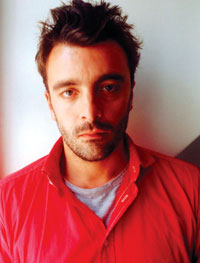
director Rupert Murray | RUPERT MURRAY
(director-editor, Unknown White Male): I’ve learned to throw away my rushes. All my life I have hoarded every tape and spool of my rushes because I’ve always had an idea at the back of my mind that I could maybe recut my films, or perhaps that the rushes were all still part of the film, part of my life. But making this film about my friend Doug who has lost his memories and learning about what memory is and how it works, I realize that the real record of your life is the edit, the final cut, because memory makes sense of all the hours of banality and gives it meaning by keeping the important stuff and junking the rest. That’s how memory works: You discard all repetition, the opening and closing of doors, lifting up your knife and fork, and you keep the significant things. |
When you make a film about memory, it teaches you certain lessons in the edit. It teaches you to rely on your instincts, and to be true to your memory of the scene, the feeling and essence of the scene and not the detail. When you cut a scene, often the first clips you use are the ones you remember without viewing the rushes.
I came to realize that memory is the original postproduction process. So from now on I’m going to chuck out my rushes and just keep the masters.
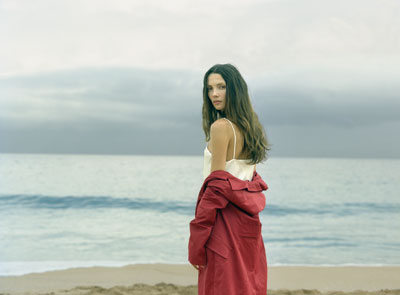 |
| Tatiana Abracos in The Girl From Monday. |
(writer-director, The Girl From Monday):
In making The Girl From Monday, I realized I no longer know what I’m doing when making films. In fact, I have felt this for years. But something about the nature of this film forced a more brutal confrontation with the feeling. Particularly with whether or not I’m connecting with anyone.
I’m okay with not knowing. I learn fast.
But although I feel like I’m part of the culture I live in, and my movies are my attempt to contribute to some part of the conversation that constitutes that culture, I feel like I speak up too early or too late to make any real contribution. It’s like the conversation has moved on or has not yet arrived, and I’m making noises appropriate of nothing.
For all I know, the new movie winds up being about this.
And it is my problem —this is what I came to understand. It is not the problem of the industry or the audience. I feel isolated on account of my interests and incompetent in regard to my ability to communicate why those interests are worthwhile.
I should add that what I’m describing is not despair. I’m working, and working is the opposite of despair. But I must become a better filmmaker in this regard. This is clear to me.
 |
| Inside Deep Throat |
(writers-directors, Inside Deep Throat):
“In with the old, out with the young!” That’s our mantra for 2005. While making Inside Deep Throat, we were endlessly fascinated by our subjects, most of whom were sixtysomething. Who needs teens when you can get passion, wisdom, humor and the occasional off-color comment from a senior citizen!
Old people are cool — and that’s where we’re all headed anyway! During the making of our film, we developed a theory that the youth culture our industry is obsessed with might actually share our point of view about this if they were given the choice. So we are hoping that wrinkles are the new black!
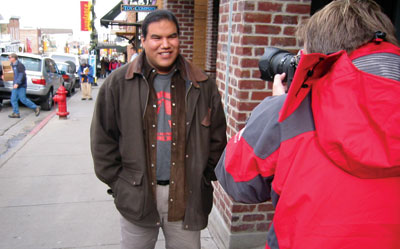 |
| Chris Eyre |
(director, A Thousand Roads):
I’d heard the term “waiting for the light” before, but up until now I’d never done it. It seems simple, but [previously as a director] I had always been trying to just make my days. This time it was difficult for me to let time pass while thinking about how I could use this precious magic-hour time at the end of the day. The sun moved in and out of clouds, and we sat. Time after time. Eventually I saw the footage and was really happy we’d waited. The landscapes in the movie are beautiful. But what I really learned is, if you are “waiting for the light,” the remaining minutes become even more precious than before.
 |
| Lynn Chen in Saving Face |
(writer-director, Saving Face):
We were on the fourth day of our shoot, and the cast and crew were starting to really jell, when all of sudden, at lunch, one table erupted with imitations of me. My laugh, my expressions, my walk. Very funny, and very humbling. Instant mortification. You never know for sure what you look like until 80 people confirm that, yes, you really do look like that, erasing any hope that you as a director might look cool at all.
I think any writer, artist, filmmaker must have had some deep dark experience from childhood, either real or imagined, that can be filed under the heading of High School Lunchroom Humiliation Nightmare. But the thing was this: it wasn’t high school; it was a room full of people who had decided to throw their energies behind my film. One of my producers once told me that how my life goes is how my film will go. I understand what she means now. Truth is, for all the time we spend trying to figure out how to “be” a director, on your film you have no time or excess energy to be anything other than yourself. And the beauty of it is that you have a shot at gaining true self-acceptance. I thank God for the team of people on my film and the real gentleness and humor with which they accepted me as a first-time director. I have never felt more alive or more myself than when I was on my shoot, and it is the experience I hope for anyone about to make their first film. (By the way, if anyone from my crew is reading this, don’t even think of trying this on our next shoot.)

director Jenni Olson | JENNI OLSON
(writer-director, The Joy of Life): On Jan. 14, 1995, my friend Mark Finch (former director of the San Francisco International Lesbian & Gay Film Festival) took his own life, leaping from the center span of the Golden Gate Bridge. It was a rainy Saturday afternoon, and no one saw him go over the side. His briefcase was found leaning against the railing at mid-span. His body drifted in the tides of the Pacific for nearly six weeks before being found, seven miles out to sea, off the coast of Pillar Point Harbor, some 25 miles south of where he’d jumped. The San Mateo County coroner described his body as intact but unrecognizable. |
In the decade since Mark’s death I have alternately avoided the bridge and felt compelled to discover more about it. What I learned while researching this film is simple, true and deeply melodramatic: If there had been a suicide barrier on the bridge, Mark would probably still be alive today.
According to its official Web site (www.goldengate.org), the primary stated mission of the Golden Gate Bridge, Highway and Transportation District is to “provide safe and reliable operation, maintenance and enhancement of the Golden Gate Bridge.” Despite the prominent reference to safety in the district’s mission statement, the board of directors has repeatedly decided against erecting a suicide barrier.
Although Mark’s suicide still seems incomprehensible to me, making this film has at least felt like a productive part of my mourning process, and I have definitely developed an activist agenda: it is my hope that The Joy of Life will be instrumental in pressuring the Golden Gate Bridge Board of Directors to finally erect a suicide barrier on the Golden Gate Bridge.
CONTENTS: PAGE 1 | PAGE 2 | PAGE 3 | PAGE 4 | PAGE 5 | PAGE 6
VOD CALENDAR


 See the VOD Calendar →
See the VOD Calendar →


